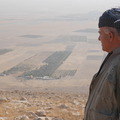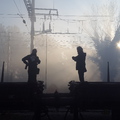All vs. all
Whatever will be the outcome of the Syrian civil war will be, the refugee crisis may grow bigger than ever before.
The European Union seems to be really taking the problem seriously. The suggestions are closing in on the source of the troubles- they are in Turkey already and once surely will arrive to the origo. Which, what a surprise, is in Syria. I'm talking about some cash and diplomatic pressure: Angela Merkel put on the table in Ankara visa liberalisation, 3 billion euros and the resumption of the membership negotiations. The aim – in exchange for all these – would be to outsource the human rights violations -together with the refugees- outside the borders of the Union.
But whatever the outcome of the Syrian civil war will be, the refugee crisis may grow bigger than ever before.
Not just the Islamic State
Ever since the troops of the Assad regime – of course due to the help of the Russian air support – had military successes on the Aleppo-Idlib line against the rebels, the common Syrian, to whom, in Bashar Al-Assad's time (just like in Hafiz's) an all-overwriting socialising experience was fear, is waiting for the situation to develop worried and if possible packed and ready to move. The average Syrian who reaches Europe of course names Islamic State as the reason for their fleeing because they can find understanding, later admittance more easily if the name of the Hollywood brand-turned terror organisation is mentioned than if they would start explaining the rough everydays of the Assad-regime. A marketing branded by journalist-heads falling into the dust in front of cameras, women as slaves, people hurled down from roofs, people burnt alive and crucified, has been so successful that no further explanation is neccessary- Islamic State, 'nuff said. While on the other hand, the delicate practices of the Assad-regime, with people disappearing and nobody knowing where they are kept and tortured, would require more explanation.
What's left out from news
Yet there are the barrel bombs, of what at least a dozen are dropped from planes and helicopters in Syria and the targets are in all cases the quarters of the civilian population. These barrel bombs are astoundingly brutal and efficient. Not just in committing genocide but in upkeeping fear and total uncertainty. These steel pipes, one meter long, forty centimetres in diameter, stuffed with TNT and steel splinters, are having the most victims of the war. Primarily civilians. Who survives it, keeps thinking on how to escape from here because of the permanent dread. Barrel bombs are not always dropped from high-flying aircraft. Helicopters are often used, whiat, according to the Syrians, first make a round and drop the bomb where the most people are. Thus the still operating markets become targets. Then the second bomb is dropped when the victims and woundeds of the first attack are being collected. The biggest part of the people arriving from the civil war-struck territories of Syria are coming here because of these and not because of the Islamic State. If the Assad-regime consolidates, a new wave will start.
Who would kill whom?
Meanwhile a mass population exchange have started inside Syria. Kurdish people are moving north, to the two big enclaves thet are phisically bound together by now, Arabians chased away from that territory by Kurds are moving to the South, the Alawites have resettled from Middle-Syria to the Western part of the country, either on the shore of the Mediterranean Sea or in Damascus. Would the Assad-system collapse despite the Russian, Iranian and Hezbollah- support, the Alawites who were ruling the country as members of the Baath Party, would be the supply of the next refugee wave. Five hundred thousand Alawites are living in Damascus, the same amount in Homs and Hama. According to the last census, held in 2010, before the civil war, 50 percent of Latakia's four hundred thousand inhabitants were Alawites and 80 out of hundred and fifty inhabitants of Tartus. If the Sunni Muslims capture these territories, the operators of the regime, the Alawites will have almost no chance to stay. The situation will be similar to what happened in Iraq after the Shiite government took office there. Also, what is being done by the army and security forces of the government at the moment, is in no way helping to raise the already terrible reputation of the Alawites among the Sunnis.
Missed opportunity
Apart from aid programs and all sorts of diplomatic efforts (if such things exist), Western allies should introduce (should have introduced?) a no-fly zone similar to the one that has been in effect over the North-Iraqi Kurdish territories since 1991. Enforcing that would greatly contribute to the decrease in the numbers of refugees. The chance of this option has dropped to zero due to the Russian intervention. After the bitter experiences of Afghanistan, it isn't likely that they would arm the rebels again with Stinger rockets with what they could efficiently protect themselves.
The conflict has transformed into an all-out proxy war between NATO and Russia. Russians are bombing the positions of the rebels, preparing the ground for the advance of the government's land forces. The rebels are reaching successes with the TOW anti-tank missiles supplied by the United States and trying to hold their ground. Don't have illusions: as long as the war goes on, the refugee crisis will stay a crisis too.
György Kakuk (Beirut)
(The project is part of the Transatlantic Leadership Initiative” (TLI) and was made possible by support from the German Marshall Fund of the United States.Opinions expressed in this publication do not necessarily represent those of the German Marshall Fund of the United States, or its partners.)





